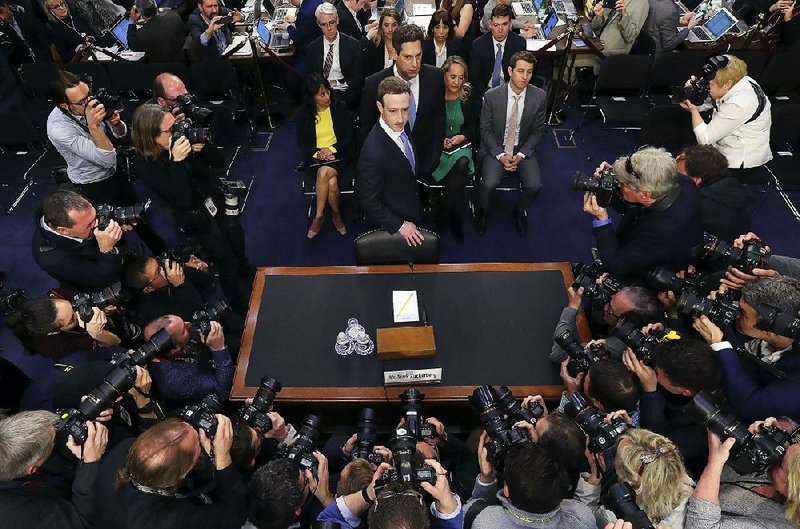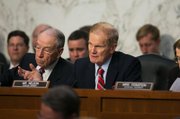WASHINGTON -- Facebook chief executive Mark Zuckerberg repeatedly expressed contrition in a congressional hearing Tuesday that featured complaints that went beyond how the social network has handled the data of millions of Americans -- touching on its role in spreading phony news and Russian disinformation.
He also confirmed that his company is "working with" special counsel Robert Mueller in the federal probe of Russian interference in the 2016 presidential campaign and that it is working hard to change its operations after reports that Cambridge Analytica, a data-mining company that was affiliated with Donald Trump's campaign, harvested up to 87 million users' private information.
Senators from both parties aggressively questioned Zuckerberg in his first ever public appearance in front of Congress. The threat of greater regulation -- not just of Facebook, but of the entire technology industry -- hung over the first of two days of congressional hearings.
"If Facebook and other online companies will not or cannot fix these privacy invasions, then we will," said Sen. Bill Nelson of Florida, the highest-ranking Democrat on the Commerce Committee.
The Tuesday event was a rare combined hearing before two Senate panels -- the Commerce and Judiciary committees -- meeting in joint session, with 44 senators questioning the Facebook executive.
Zuckerberg, who traded his trademark T-shirts and hoodies for the standard Capitol Hill suit and tie, sought to quell the concerns of lawmakers and vowed to make meaningful changes.
"It's clear now that we didn't do enough to prevent these tools from being used for harm," Zuckerberg said at the Senate hearing. "And that goes for fake news, foreign interference in elections, and hate speech, as well as developers and data privacy."
Zuckerberg, who has long avoided wading into Washington affairs, took responsibility for the missteps.
"We didn't take a broad enough view of our responsibility, and that was a big mistake. And it was my mistake, and I'm sorry. I started Facebook, I run it, and I'm responsible for what happens here."
The public apology seemed to achieve a measure of success: Facebook shares surged 4.5 percent for the day, the biggest gain in two years.
Referring to Mueller's Russia investigation, Zuckerberg said he has not been personally interviewed by the special counsel's team, but "I know we're working with them." He offered no details, citing a concern about confidentiality rules of the investigation.
Earlier this year Mueller charged 13 Russian individuals and three Russian companies in a plot to interfere in the 2016 presidential election through a social media propaganda effort that included online ad purchases using U.S. aliases and politicking on U.S. soil. A number of the Russian ads were on Facebook.
Zuckerberg acknowledged that the company was too slow to respond to the Russian interference and said it was "working hard to get better." The company has said that as many as 146 million people may have received information from a Russian agency that's accused of orchestrating much of the cyber-meddling in the election.
He outlined steps the company has taken to restrict outsiders' access to people's personal information. He also said the company is investigating every app that had access to a large amount of information before the company moved to prevent such access in 2014 -- actions that came too late in the Cambridge Analytica case.
MISTAKES MADE
During Tuesday's at-times-contentious hearing, Zuckerberg said it had been "clearly a mistake" to believe that Cambridge Analytica had deleted user data that it had harvested in an attempt to sway elections.
He said Facebook had considered the data collection "a closed case" because it thought the information had been discarded.
Facebook also didn't alert the Federal Trade Commission, Zuckerberg said, and he assured senators that the company would handle the situation differently today.
Separately, Facebook began alerting some of its users that Cambridge Analytica had acquired their data. A notification that appeared on Facebook for some users Tuesday told them that "one of your friends" used Facebook to log into a now-banned personality quiz app called "This Is Your Digital Life." The notice says the app misused the information, including public profiles, page likes, birthdays and current cities, by sharing it with Cambridge Analytica.
Zuckerberg has apologized many times already, to users and the public, but this was the first time before Congress. He is to testify today before the House Energy and Commerce Committee.
Sen. John Thune, R-S.D., the Senate Commerce Committee chairman, told Zuckerberg that his company had a 14-year history of apologizing for "ill-advised decisions" related to user privacy. "How is today's apology different?" he asked.
"We have made a lot of mistakes in running the company," Zuckerberg responded. "I think it's pretty much impossible, I believe, to start a company in your dorm room and then grow it to be at the scale that we're at now without making some mistakes."
Zuckerberg said Facebook is going through "a broader philosophical shift in how we approach our responsibility as a company." He said the company needs to take a "more proactive role" that includes ensuring the tools it creates are used in "good and healthy" ways.
Sen. Orrin Hatch, R-Utah, said Zuckerberg's appearance marked the most intense hearing for a technology company since entrepreneur and businessman Bill Gates testified before Congress in March 1998.
Many of the senators' questions seemed to focus on Facebook's basic functions, such as its privacy settings and what it does and doesn't do with user data. Because each of the 44 senators had just 5 minutes to ask questions, there was little time for tough follow-ups. On some subjects, Zuckerberg told the lawmakers that his people would get back to them with more information.
But in other cases, Zuckerberg took the questions head-on. In one exchange, Thune questioned whether the business model of Facebook -- which makes money by selling online advertisements based on what it learns about users on the platform -- was flawed.
"Mr. Zuckerberg, in many ways you and the company that you've created, the story you've created, represent the American Dream," Thune said. "Many are incredibly inspired by what you've done. At the same time, you have an obligation, and it's up to you, to ensure that dream doesn't become a privacy nightmare for the scores of people who use Facebook."
Zuckerberg argued that by relying on advertising revenue, Facebook could reach far more users than otherwise possible.
"We want to offer a free service that everyone can afford. That's the only way we can connect billions of people ... and is most aligned with our mission of connecting everyone in the world," he said.
OPEN TO REGULATIONS
Democrats like Nelson have argued that federal laws might be necessary to ensure user privacy. Republicans have yet to get behind any such legislation, but that could change.
Sen. Lindsey Graham, R-S.C., asked Zuckerberg if he would be willing to work with lawmakers to examine what "regulations you think are necessary in your industry."
Absolutely, Zuckerberg responded, saying later in an exchange with Sen. Dan Sullivan, R-Alaska, that "I'm not the type of person who thinks that all regulation is bad." He called for a "full conversation about what is the right regulation not whether it should be or shouldn't be."
Sen. John Cornyn of Texas, a member of the Judiciary panel and the No. 2 Republican in the Senate, appeared open to regulation in a speech ahead of the hearing. Cornyn said apologies are "not enough" and suggested legislation could eventually be needed to give consumers more control over their data privacy.
"This is a serious matter, and I think people expect us to take action," Cornyn told reporters after his speech.
Sen. Edward Markey, D-Mass., planned to introduce a bill Tuesday called the Consent Act that would require social giants like Facebook and other major Web platforms to obtain explicit consent before they share or sell personal data.
Lawmakers also have expressed interest in broadening their inquiry to other technology companies, including Google and Twitter.
Hours ahead of the hearing, spectators lined up along the walls of the Hart Senate Office Building. Inside, Facebook aides -- including Elliot Schrage, the company's vice president of communications and public policy -- bided time by making the rounds with reporters, a day after the social network's lobbyists shuttled Zuckerberg to the offices of lawmakers.
One person in the audience at Tuesday's hearing was dressed as a Russian troll -- in a scoutlike uniform with fake troll hair as a hat, and a scarf that resembled a Russian flag. Three other people at the hearing rose in protest before Zuckerberg entered. Wearing neon-colored, oversized glasses that read "stop spying," they displayed poster boards -- labeled Code Pink -- that read "stop corporate spying" and "protect our privacy" and "Like us on Facebook."
Outside, on the Capitol's lawn, 100 life-size cutouts of Zuckerberg sported T-shirts saying, "fix fakebook" -- the work of an advocacy group, Avaaz, working to call attention to how fake accounts spread disinformation on the social network.
Information for this article was contributed by Craig Timberg, Tony Romm and Elizabeth Dwoskin of The Washington Post; and by Mary Clare Jalonick, Barbara Ortutay and Lisa Mascaro of The Associated Press.
A Section on 04/11/2018


